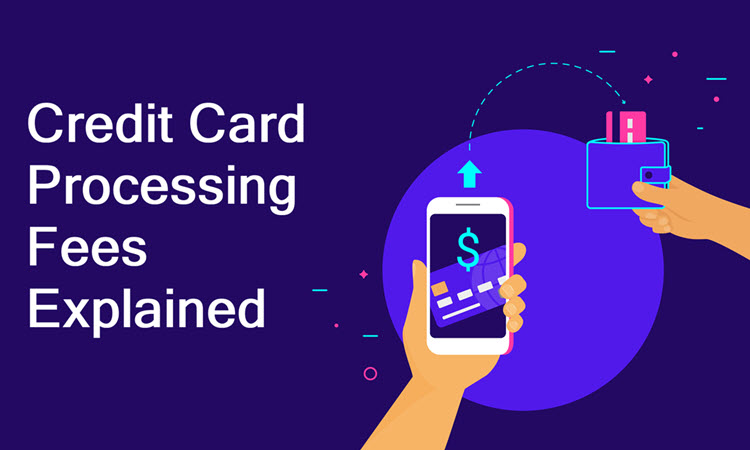Doesn’t matter whether you own a brick-and-mortar store or are an online business owner, you will need to work with a payment processor to accept credit card payments. Apart from the very obvious payment processing fee charged by payment processors, other financial entities that participate in the process charge a fee for their services too.
Merchants need to understand which processing fees apply and how to calculate them in order to precisely estimate their revenue.
In this guide, we’ll explain all credit card processing fees and their key elements.
What Are Credit Card Processing Fees?

Every credit card payment includes processing fees that are deduced before the funds are transferred to the merchant’s account.
Credit card fees are the charges merchants need to pay for each debit or credit card transaction made to their merchant accounts. These fees may vary based on factors such as type of transaction (card present or card-not-present), the type of credit cards you accept and the payment processor you work with.
Note: Refer to our post about what a merchant statement is and learn how to read it.
Who Determines Merchant Processing Fees?

The following three major payment processing participants determine merchant processing fees:
The Card Issuer (The Bank)
The card issuer is the financial entity that issues credit cards. It charges the merchant a specific fee for every credit card payment they accept. The card issuer fee consists of a percentage of the payment and a flat fee.
The Card Association
The credit card association is the financial entity that handles credit card transactions between bank issuers and merchants. The four most popular credit card associations in the U.S. are Mastercard, Visa, American Express, and Discover.
The Payment Processor
The payment processor handles online and offline credit card payments via payment gateways, mediating between merchants, card associations, and other financial institutions (e.g., issuing banks and acquiring banks) to complete the payments.
Payment processors usually charge merchants a percentage of every credit card payment or a flat fee.
Note: Learn all you need to know about how payment processing works.
Factors That Determine the Final Fee

The following factors determine the full credit card payment processing fees:
Interchange Fees
Card issuers charge merchants interchange fees for every debit and credit card transaction they receive – it’s the fee paid by the acquiring bank (merchant’s bank) to the issuing bank (customer’s bank).
These fees are not uniform. Every credit card association has its own fees and adjusts them periodically.
Interchange fees depend on the type of transaction and the type of merchant accepting credit cards. These fees are sometimes higher for online transactions since a credit card is not physically present for the payment.
Here’s an overview of the processing fees charged by credit card associations.
| Credit Card Association | Processing Fees |
|---|---|
| Visa | 1.43%-2.4% |
| MasterCard | 1.55%-2.6% |
| American Express | 2.5%-3.6% |
| Discover | 1.56%-2.3% |
Dues and Assessments
Dues and assessments are the fees that credit card associations charge for using their card brands and processing payments via their infrastructure.
Payment processors collect these fees from merchants and forward them directly to credit card associations.
Dues and assessments aren’t charged per transaction, but they’re based on total monthly transactions that a merchant had. They depend on the card payment (debit or credit), the payment volume, and the transaction type (domestic vs. international payments).
Note: Dues and assessments are usually lower than interchange fees.
Payment Processor’s Fee
A payment processor’s fee is the amount of money merchants pay to payment processors for their services. It’s usually charged per transaction, and it consists of several smaller fees, like statement fees or equipment fees.
Payment Gateway Fee
Payment gateway fees are paid to payment gateways, software service providers encrypting and sending customers' personal and bank data transactions to merchant accounts and payment processors.
Note: Refer to our other article to learn more about differences between payment processors and payment gateway.
PCI Compliance Fee
Merchants need to follow the payment card industry compliance (PCI Compliance) and meet the international technical and operational standards to protect customer data during credit card transactions.
Payment processors may charge certain fees to ensure that credit card payments they facilitate on the merchants’ behalf are PCI compliant. Some payment processors don’t charge this fee separately. Instead, they include it in the base fee.
Chargeback Fees
Merchants need to pay a chargeback fee to payment processors when customers dispute a credit card transaction made to merchant accounts.
Note: Learn about chargebacks in our guide What Is a Chargeback?
Type of Transaction
Processing fees are usually lower for point-of-sale (POS) credit card payments than card-not-present (CNP) payments.
This is so because POS transactions are less prone to fraud. Every credit card has a chip that forms a special digital token for every POS transaction. A combination of this chip and a unique PIN that a customer enters when making a payment makes POS transactions more secure than card-not-present payments.
Risk Level
Payment processors label some businesses as high-risk due to the industry they operate in, their financial record, or their location.
High-risk merchants are typically charged higher fees because they carry a higher risk of fraud and chargeback.
Payment processors and banks need to engage more resources into analyzing high-risk merchants and processing their payments. Since it costs more to supervise and handle high-risk merchants, payment providers impose higher credit card processing fees for such entities.
Note: If you are running a high-risk business, refer to our post High Risk Merchant Accounts to learn everything you need to know.
POS Software and Hardware Fees
Merchants that rent POS software and POS hardware pay fees to providers of these payment terminals.
Monthly Minimum Fees
If your payment processor has set a minimum monthly payment volume you need to process, they’ll charge you a fee if your transactions drop below that minimum.
Batch Fees
Some payment processors charge merchants with batch fees for collecting deposits daily or weekly.
Support Service Fees
Support service fees are usually flat fees collected monthly by some payment processors for various support services.
How to Reduce Credit Card Processing Fees?
Merchants can reduce credit card processing fees by applying the following tips:
-
Reduce the risk of chargeback. Banks may consider businesses that receive a lot of chargeback requests as high-risk merchants. Consequently, they charge them higher processing fees. To reduce the number of chargebacks, use authorization forms in which you formulate the chargeback policy. Recurring customers sign these forms so you can collect recurring payments regularly without paying chargebacks.
-
In-person payments have lower fees. Processing fees for online and keyed-in credit card transactions in which the credit card is not physically present are higher than for POS (point of sale) payments, due to higher fraud risks. Go for in-person credit card payments whenever possible.
- Talk with your payment processor. Your payment processor knows the details and history of your credit card processing fees. They might identify some areas for improvement and provide practical advice.
-
Reduce the risk of fraud. High fraud rates may increase credit card processing fees. Make sure that your online store is safe and secure. Also, work with a payment processor that has fraud protection and strong customer authentication systems.
Note: Learn more about PSD2 and SCA - Strong Customer Authentication, how payments are regulated in the EU and how fraud is prevented.
Conclusion
While credit card processing fees must be paid, not all entities participating in credit card payments have the same fees.
Always check with a payment processor which payment processing fees you can expect. Compare their offer with other payment processors and choose the one that will process your transactions securely and reliably at the most affordable rates.
